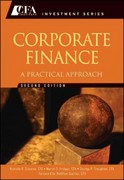The NPV and IRR, respectively, of the Gasup Company investment are closest to: A. ($509),600 and 21.4%.
Question:
The NPV and IRR, respectively, of the Gasup Company investment are closest to:
A. \($509\),600 and 21.4%.
B. \($509\),600 and 31.3%.
C. \($946\),700 and 31.3%.
Maximilian Bo¨hm is reviewing several capital budgeting proposals from subsidiaries of his company. Although his reviews deal with several details that may seem like minutiae, the company places a premium on the care it exercises in making its investment decisions.
The first proposal is a project for Richie Express, which is investing \($500\),000, all in fixed capital, in a project that will have depreciation and operating income after taxes, respectively, of \($40\),000 and \($20\),000 each year for the next three years. Richie Express will sell the asset in three years, paying 30 percent taxes on any excess of the selling price over book value. The proposal indicates that a \($647\),500 terminal selling price will enable the company to earn a 15 percent internal rate of return on the investment. Bo¨hm doubts that this terminal value estimate is correct.
Another proposal concerns Gasup Company, which does natural gas exploration. A new investment has been identified by the Gasup finance department with the following projected cash flows:
• Investment outlays are \($6\) million immediately and \($1\) million at the end of the first year.
• After-tax operating cash flows are \($0.5\) million at the end of the first year and \($4\) million at the end of each of the second, third, fourth, and fifth years. In addition, an after-tax outflow occurs at the end of the five-year project that has not been included in the operating cash flows: \($5\) million required for environmental cleanup.
• The required rate of return on natural gas exploration is 18 percent.
The Gasup analyst is unsure about the calculation of the NPV and the IRR because the outlay is staged over two years.
Finally, Dominion Company is evaluating two mutually exclusive projects: The Pinto grinder involves an outlay of \($100\),000, annual after-tax operating cash flows of \($45\),000, an after-tax salvage value of \($25\),000, and a three-year life. The Bolten grinder has an outlay of \($125\),000, annual after-tax operating cash flows of \($47\),000, an after-tax salvage value of \($20\),000, and a four-year life. The required rate of return is 10 percent. The net present value (NPV) and equivalent annual annuity (EAA) of the Pinto grinder are \($30\),691 and \($12\),341, respectively. Whichever grinder is chosen, it will have to be replaced at the end of its service life. The analyst is unsure about which grinder should be chosen.
Bo¨hm and his colleague Beth Goldberg have an extended conversation about capital budgeting issues, including several comments listed below. Goldberg makes two comments about real options:
i. “The abandonment option is valuable, but it should be exercised only when the abandonment value is above the amount of the original investment.”
ii. “If the cost of a real option is less than its value, this will increase the NPV of the investment project in which the real option is embedded.”
Bo¨hm also makes several comments about specific projects under consideration:
A. “The land and building were purchased five years ago for \($10\) million. This is the amount that should now be included in the fixed capital investment.”
B. “We can improve the project’s NPV by using the after-tax cost of debt as the discount rate. If we finance the project with 100 percent debt, this discount rate would be appropriate.”
C. “It is generally safer to use the NPV than the IRR in making capital budgeting decisions.
However, when evaluating mutually exclusive projects, if the projects have conventional cash flow patterns and have the same investment outlays, it is acceptable to use either the NPV or IRR.”
D. “You should not base a capital budgeting decision on its immediate impact on earnings per share (EPS).”
Step by Step Answer:

Corporate Finance A Practical Approach
ISBN: 9781118217290
2nd Edition
Authors: Michelle R Clayman, Martin S Fridson, George H Troughton, Matthew Scanlan





